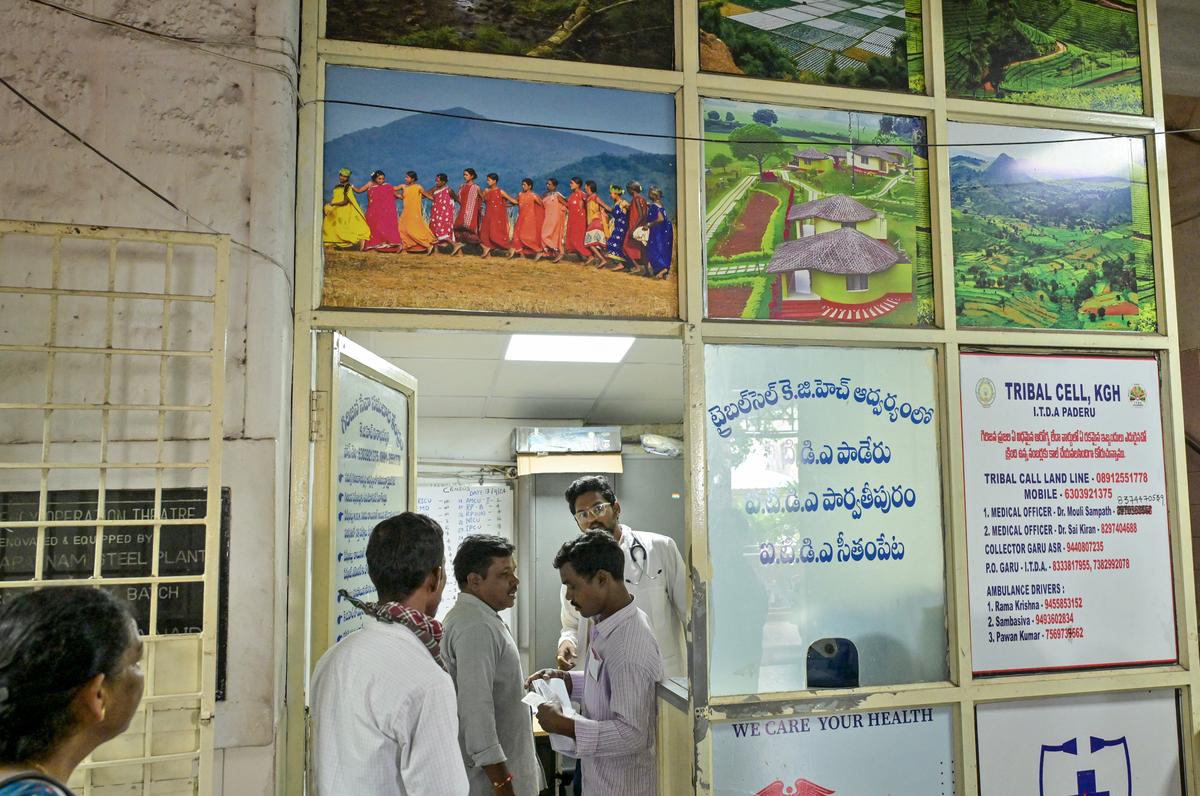
A doctor interacting with a tribal inpatient at Tribal Cell in King Goerge Hospital in Visakhapatnam on Saturday.
| Photo Credit: K.R. DEEPAK
The Tribal Cell in Andhra Pradesh State government-owned Andhra Medical College – King George Hospital (AMC-KGH), here, appears to be unique in the country in serving the tribals from the surrounding forest areas of north coastal Andhra Pradesh. Here, the staff speak the tribal language (known as Savara) to understand the patients, behaviour and habits better.

A doctor interacting with a tribals atthe Tribal Cell in King Goerge Hospital, Visakhapatnam on Saturday.
| Photo Credit:
K.R. DEEPAK
Inaugurated in 2005, the facility is the first in the country to serve the tribals of the Integrated Tribal Development Agency (ITDA) of Paderu, Rampachodavaram, Parvathipuram, Chintoor and Seethampeta agencies along the Eastern Ghats and in the coastal districts along the Bay of Bengal.
When The Hindu enquired on September 14, 2024, a total of 208 tribals were taking treatments in the hospital beds, for various health problems ranging from cancer, gynaecological, paediatric, fevers and some other accidental cases like burns, road accidents etc.
As per the statistical data of 12-month period (from July 2023 to June 2024), the total number of outpatients was 4,112, in patients (5,757), deaths (759), emergency medical services (833), laboratory diagnostic services (560), blood bank services (355) and mortuary services (403).
It is located next to the Casualty Ward in the Main Outpatient Building, while entering through the OP Gate of KGH. It was an initiative of the then ITDA Paderu in erstwhile Visakhapatnam district for the treatment of tribals of remote villages. Later, it received appreciation from the public and governments, and continued its service by frequently upgrading the quality of its facilities and services.
“The aim of the Tribal Cell is to reduce the fear and anxiety in the tribals and persuade them to get treatment in hospitals, limit the difficulties due to lack of knowledge and language, and provide access to high specialised care available in cities like Visakhapatnam or refer them to other metros if needed. It also helps Andhra Medical College students and faculty for research studies as tribals suffer from rare diseases like sickle cell anaemia due to their habitat. According to my knowledge, I can say that no State in the country has such a huge and dedicated Tribal Cell to cater to the needs of five ITDAs,” the Tribal Cell Chief Coordinator A.P.V.V.S.M. Sampath told The Hindu.
Dr. Sampath further said that most people from doctors to support staff know the tribal language as some of them were born in tribal areas, studied medical courses and worked in tribal areas. They have been deployed here for service for some time on rotational basis. The staff are fully authorised by Alluri Sitharama Raaju district, where they are paid, but work in the Cell located in the City.
Tribal Cell works 24×7 and provides emergency medicines free of cost that ranges from ₹1,500 to ₹2,000. It also provides laboratory diagnostic services, blood, counselling, hearse van services for dead patients from the mortuary to home. Three hearses are available at present.
Services are in three shifts (8 a.m. to 2 p.m., 2 p.m. to 8 p.m. and 8 p.m. to 8 a.m.). The staff change shifts every 10 days.
ASR District Medical Officer Jamal Basha said, “This facility is one of the big assets for agency districts and ITDAs to provide prompt and quality services in emergencies like in the recent case of food poisoning of children. We can say that it is a role model for other States.”
Published – September 16, 2024 12:47 am IST





